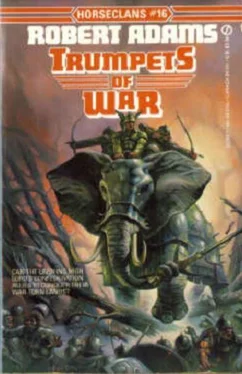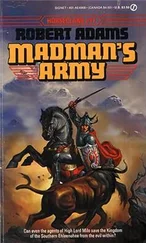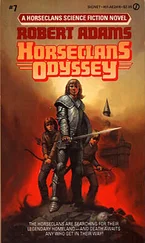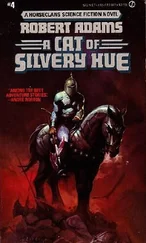Portos’ heavy cavalry fought hard and bravely for a few minutes after the initial assault, their sharp sabers carving deeply into the formations of opposing horsemen, even penetrating completely through, into the skimpily armored ranks of light-infantry peltasts who flanked the pike lines. But then, abruptly, a banner was seen to go down, and with cries and loud lamentations they began to try to disengage and withdraw in the direction of their own lines.
Sensing a victory of sorts within grasping distance, the entire left wing of the bandits’ army—horse and light foot alike—quitted their assigned positions to stream out in close pursuit of the retreating heavy horse.
And no sooner had they left the flank they had been set there to guard than up out of a brushy gully filed Sunshine, Tulip and Newgrass. With practiced speed, the cloth shroudings were stripped away, the last few pieces of armor put on and the heavy, unwieldy metal-plated boxes were lifted up onto the broad backs and strapped into place. As the archers clambered up into the boxes, Captain of Elephants Gil Djohnz and the other two feelahksee were lifted by the pachyderms to their places just behind the armored domes of the huge heads and those men still gathered about on the ground uncased the outsize swords—six feet long in the blades, broad and thick and very heavy, with both edges ground and honed to razor sharpness—which the behemoths would swing with their trunks in the initial attack. All of these last-minute preparations had been well rehearsed and so took bare minutes in the accomplishment. Once fully equipped and armed and out of the gully in which they had hidden, the three huge, fearsome-looking beasts set out in line abreast at a walk which the trailing and flanking lancers had some difficulty in matching for speed over the uneven terrain.
Now, much of Mainahkos’ “infantry” was no such thing, save by the very loosest definition of the term. Rather were the most of them just a very broad cross-section of male citizens who had been impressed in the streets of the city at the points of swords and spears, handed a short pike and hustled willy-nilly into an aggregation of fellow unfortunates, then all marched out to add depth and length to the bandits’ pike lines. To these, the mere distant sight of the three proboscideans fast bearing down upon them, swinging terrible two-mehtrah swords, their high backs crowded with archers and a horde of mounted lancers round about them, was all that was needful to evoke a state of instant, screaming panic.
Bandit army veterans strode and rode among the impressed men they chose to dignify with the term “citizen spear levy.” With shouts and with curses, with fists and whips and swordflats and spearbutts, they tried to lay the panic, get the untrained men faced around to try to repel the flank attack, all the while cursing the peltasts and heavy horse for so exposing the flank and profanely wondering just when Lord Mainahkos would get around to sending the reserve cavalry to replace those who had ridden off to who knew where.
Of course, they could not know that a few minutes before, Pawl Vawn of Vawn had farspoken but a single thought: “Now, cat-brother!”
With bloodcurdling squalls, the seven mighty prairiecats had burst from out the tiny copse and sped toward the mounting cavalry reserve. All of them broad-beaming mental pictures of blood and of hideous death for equines, never ceasing their cacophony of snarls, growls, squalls and howls, the muscular cats rapidly closed the distance between the copse and the horses and men.
Within the City of Kahlkopolis, things were not well. Ahreekos, frantic for a better view of the battle, one not partially obscured by folds of ground, high brush or copses, had decided on the city’s highest tower as an observation point and had led his followers in the climb up to its most elevated level. However, less than a third of the way up, he had gasped and fallen on a landing, jerking and beginning to turn a grayish blue in the face.
His followers had almost ruptured themselves in bearing his broad, corpulent bulk down the narrow spiral stairway, only to find upon finally reaching the first level that they had been carrying a fat corpse. Ahreekos was dead.
Leaving the body precisely where it lay, pausing only to strip off rings, bracelets and anything else of value from it, in the way of their unsavory ilk, the followers departed and began to make ready to leave the city, for what they had already been able to see of the progress of the battle had not been at all encouraging. It would seem that overconfident Mainahkos had finally met his match in the person of this white-haired eastern strahteegos and his small but very effective army, and the personal slogans of all of those who had for so long followed the two warlords had always been “He who fights and runs away lives to run away another day.” They were, after all, not warriors but opportunists, and so could desert without even a twinge of shame.
The condition of Mainahkos’ main battle line was not at all pleasant, for all that there had not as yet been any contact with the enemy for the front ranks or the right flank. Numerous small engines, apparently situated just behind the enemy center, had been hurling stones and long, thick spears in high arcs to fall with effect both devastating and deadly among their close-packed ranks, reducing the depth as rear-rankers needs must advance to plug the gory gaps. But it suddenly got worse, far worse.
At almost the same instant, three towering war-elephants crashed into the left flank and began to roll it speedily up, while elements of their own cavalry reserve slammed into the rear of the right-flank formations, and the panic of those horses, for some unknown reason, spread like wildfire among the horses of the heavy cavalry guarding that flank as well.
In the space between the two opposing battle lines, the harried, now-wounded commander of the war-carts just stared, astounded. Like Stehrgiahnos a broken nobleman and the man who had persuaded the two warlords to build and fit out the carts to serve the functions of the elephants that they did not have and never had had for the bandit army, he had known his full share of formal warfare in better days, but even then he had never before heard of such a thing as this.
Leaving their secure, unthreatened position, the entire length of the enemy pike line was advancing, moving at a brisk walk, their lines still even and dressed, their pikes at high-present—shoulder height—an array of winking steel points that projected well ahead of the marching lines. It was an unholy occurrence, thought the renegade; the miserable infantry simply did not advance against armored war-carts. It was unthinkable!
For him, it was truly unthinkable. Basically akin to Captain Ahzprinos of the opposing force, a less than imaginative or creative man, he did then the only thing of which he could think to do. He signaled and led a withdrawal back to whence he and the others had come, back to their own lines.
But before the carts could reach the left wing, their own infantry lines suddenly surged forward, looking less like a formation of men than like a cylinder of raw dough pressed mightily at both ends. The boiling press of men thoroughly blocked the way of the carts.
Deeply contemptuous of the common footmen at even the best of times, the commander led his force directly into the infantry, carving a gore-streaked path through them up until the moment that a wild-eyed, terrified man smote him across the backplate with a poleaxe and flung him to the ground at just the proper time and place to be raggedly decapitated by the sharp, blood-slimed, whirling blades projecting from a wheel hub of his own war-cart.
Portos’ squadron of heavy horse had continued their “panicky withdrawal” until he judged that the enemy horse and peltasts had all been drawn far enough out that they could not easily or quickly return to their assigned positions and that the way was thus clear for the elephants and supporting lancers to assault the left flank of the bandits’ pike lines. Then, abruptly, the “fallen” banner was raised high again and flourished, and the squadron reined about and began to fight, not flee. They had hacked a good half of their erstwhile pursuers from out their saddles before the survivors broke and fled, scattering the peltasts before them.
Читать дальше












